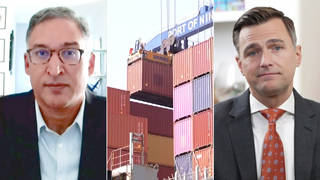
Guests
- David Dayenreporter and author of the award-winning book Chain of Title: How Three Ordinary Americans Uncovered Wall Street’s Great Foreclosure Fraud.
We look at two of Donald Trump’s Cabinet picks: Steven Mnuchin for treasury secretary and Wilbur Ross for commerce secretary. Mnuchin has deep ties on Wall Street, including working as a partner for Goldman Sachs, and his hedge fund played a role in the housing crisis after it scooped up the failing California bank IndyMac in 2008. Trump’s commerce secretary pick, Wilbur Ross, is a billionaire private equity investor who specializes in flipping bankrupt companies for profit, often buying the U.S. companies at low prices and then selling them to overseas investors. He and his companies have sometimes shipped jobs and factories overseas—practices Donald Trump has railed against. We are joined by David Dayen, whose recent article for The Nation is “Wilbur Ross and Steve Mnuchin—Profiteers of the Great Foreclosure Machine—Go to Washington.”
Transcript
AMY GOODMAN: We turn to look in more detail at two of Donald Trump’s Cabinet picks: Steven Mnuchin for treasury secretary and Wilbur Ross for commerce secretary. Mnuchin has deep ties to Wall Street, including working as a partner for Goldman Sachs, where his father also worked. Mnuchin’s hedge fund also played a role in the housing crisis after it scooped up the failing California bank IndyMac in 2008. Under Mnuchin’s ownership, IndyMac foreclosed on 36,000 families, particularly elderly residents trapped in reverse mortgages. Mnuchin was accused of running a foreclosure machine. People protested outside his home. The bank, which was renamed OneWest, was also accused of racially discriminatory lending practices. In 2015, Mnuchin sold the bank for $3.4 billion, $1.8 billion more than he bought it for.
Trump’s commerce secretary pick, Wilbur Ross, is a billionaire private equity investor. Ross specializes in flipping bankrupt companies for profit, often buying the U.S. companies at low prices, then selling them to overseas investors. He and his companies have sometimes shipped jobs and factories overseas, practices Donald Trump has railed against. He, too, had a role in the foreclosure crisis. In 2007, Wilbur Ross bought the second-largest servicer of subprime loans in America, a company called American Home Mortgage Servicing.
To talk more about Mnuchin and Ross, we’re joined by David Dayen, author of the award-winning book Chain of Title: How Three Ordinary Americans Uncovered Wall Street’s Great Foreclosure Fraud. His most recent piece for The Nation, “Wilbur Ross and Steve Mnuchin—Profiteers of the Great Foreclosure Machine—Go to Washington.”
So, talk about the significance of this, David. Talk about who Mnuchin and Ross are.
DAVID DAYEN: Right, so they are both—I call them profiteers because they, like most banks and mortgage servicing companies, just profited from the lack of attention to the foreclosure crisis at the federal level. Mnuchin foreclosed on 36,000 people—in California alone. He foreclosed on much more through OneWest Bank, where he was CEO. And Wilbur Ross, through American Home Mortgage Servicing, which eventually became a company called Ocwen, also did so, and they did so illegally. These were fraudulent foreclosures, where fake documents were used to prop up those foreclosures. There are depositions with individuals from OneWest Bank saying that they spent 30 seconds looking at foreclosure files before signing affidavits that said that they knew everything in that file and reviewed all the business practices. There were forged documents routinely from Wilbur Ross’s American Home Mortgage Servicing. They were done by a third-party company known as DocX, where the CEO of that company actually is in prison right now, went to prison for five years for forging millions of mortgage assignments to be used as evidence in court cases all over the country. So, these were very normal practices, but it’s very ironic that the Obama administration kind of lost track and didn’t pay attention to this crisis that was going on. And now, after Trump’s election, he brings in two people who profited almost the most from that to help run his Cabinet.
AMY GOODMAN: And what does it mean to be head of treasury and commerce? How does that relate to what their history is around the issue of foreclosure?
DAVID DAYEN: Well, certainly, the Treasury Department is a regulatory position now. Steven Mnuchin will be the head of the Financial Stability Oversight Council, which is a superregulator that monitors systemic risk, where there was a lot of systemic risk from the financial crisis and the foreclosure crisis, and he can kind of shut it down. Steven Mnuchin has said that he will seek to privatize Fannie Mae and Freddie Mac, where nine out of 10 mortgages are owned or guaranteed right now. That’s going to be a huge windfall for the hedge funds that bought Fannie and Freddie stock at a low point, at a dollar a share. If that’s spun out and privatized, it would be $30 to $40 a share.
Incidentally, one of the biggest benefactors of that would be John Paulson, who was a business partner to Steven Mnuchin in the OneWest deal. So, you know, through deregulation, through just the lack of attention to these matters, Steven Mnuchin is going to have a lot of control. Wilbur Ross, maybe less so at the Commerce Department, but still you’re talking about Donald Trump’s closest advisers, and it’s very likely they’re going to take their eyes off the ball with respect to the practices of the mortgage industry.
AMY GOODMAN: Well, David Dayen, I want to thank you for being with us, author of the award-winning book Chain of Title: How Three Ordinary Americans Uncovered Wall Street’s Great Foreclosure Fraud. We will link to your piece in The Nation.













Media Options